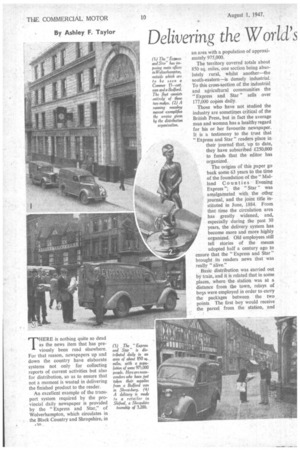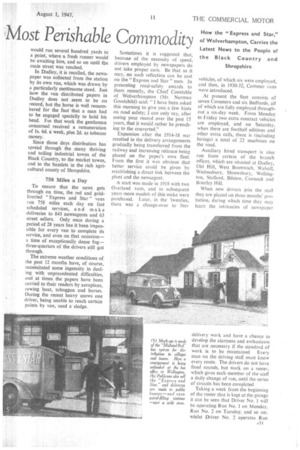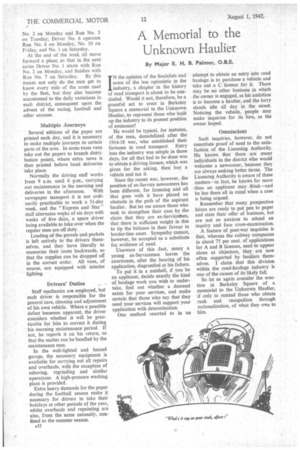Delivering the World'
Page 32

Page 33

Page 34

If you've noticed an error in this article please click here to report it so we can fix it.
Most Perishable Commodity
THERE is nothing quite so dead as the news item that has previously been read elsewhere. For that reason, newspapers up and down the country have elaborate systems not only for collecting reports of current activities but also for distribution, so as to ensure that not a moment is wasted in delivering the finished product to the reader.
An excellent example of the transport system required by the provincial daily newspaper is provided by the "Express and Star," of Wolverhampton, which circulates in the Black Country and Shropshire, in an area with a population of approximately 975,000.
The territory covered totals about 850 sq. miles, one section being absolutely rural, whilst another—the south-eastern—is densely industrial. To this cross-section of the industrial and agricultural communities the "Express and Star" sells over 177,000 copies daily.
Those who have not studied the industry are sometimes critical of the British Press, but in fact the average man and woman has a healthy regard for his or her favourite newspaper. It is a testimony to the trust that "Express and Star" readers place in their journal that, up to date, they have subscribed £250,000 to funds that the editor has organized.
The origins of this paper go back some 63 years to the time of the foundation of the" Midland Counties Evening Express "; the " Star " was amalgamated with the othej. journal, and the joint title instituted in June, 1884. From that time the circulation area has greatly widened, and, especially during the past 30 years, the delivery system has become more and more highly organized. Old employees still tell stories of the means adopted half a century ago to ensure that the "Express and Star" brought its readers news that was really "alive."
Basic distribution was carried out by train, and it is related that in some places, where the station was at a distance from the town, relays of boys were employed in order to carry the packages between the two points The first boy would receive the parcel from the station, and would. run several hundred yards to a point, where a fresh runner would be awaiting him, and so on until the main street was reached.
In Dudley, it is recalled, the newspaper was collected from the station by its own van, which was drawn by a particularly mettlesome steed. Just how the van distributed papers in Dudley does not seem to be on record, but the horse is well remembered for the fact that a man had to be engaged specially to hold his head. Fot that work the gentleman concerned received a remuneration of Is. 6d. a week, plus 2d. as tobacco money.
Since those days distribution has spread through the many thriving and toiling industrial towns of the Black Country, to the market towns, and to the hamlets in the rich agricultural county of Shropshire.
758 Miles a Day To ensure that the news gets through on time, the red and goldliveried "Express and Star" vans run 758 miles each day on fast scheduled services, and make deliveries to 843 newsagents and 63 street sellers. Only once during a period of 28 years has it been impossible for every van to complete its service, and even on that occasion— a time of exceptionally dense fog— three-quarters of the drivers still got through.
The extreme weather conditions of the past 12 months have, of course, necessitated some ingenuity in dealing with unprecedented difficulties, and at times the papers have been carried to their readers by aeroplane, rowing boat, toboggan and horses. During the recent heavy snows one driver, being unable to reach certain points by van, used a sledge. Sometimes it is suggested that, because of the necessity of speed, drivers employed by newspapers do not take proper care. Be that as it may, no such reflection can be cast on the "Express and Star" men. In presenting road-safety awards to them recently, the Chief Constable of Wolverhampton (Mr. Norman Goodchild) said: "I have been asked this morning to give you a few hints on road safety; I can only say, after seeing your record over the past 15 years, that it would rather be preaching to the converted."
Expansion after the 1914-18 war resulted in the delivery arrangements gradually being transferred from the railway and increasing reliance being placed on the paper's own fleet. From the first it was obvious that better service Could be given by establishing a direct link between the plant and the newsagent.
A start was made in 1918 with two Overland vans, and in subsequent years more models of this make were purchased. Later, in the 'twenties, there was a change-over to Star vehicles, of which six were employed, and then, in 1930-32, Commer vans were introduced.
At present the fleet consists of seven Commers and six Bedfords, all of which are fully employed throughout a six-day week. From Monday to Friday two extra contract vehicles are employed, and on Saturday, when there are football editions and other extra calls, there is (including hirings) a total of 22 machines on the road.
Auxiliary hired transport is also run from certain of the branch offices, which are situated at Dudley, Old Hill, West Bromwich, Walsall, Wednesbury, Shrewsbury, Wellington, Stafford, Bilston, Cannock and Brierley Hill.
When new drivers join the staff they are placed on three months' probation, during which time they may learn the intricacies of newspaper delivery work and have a chance to develop the alertness and enthusiasm that are necessary if the standard of work is to be maintained Every man on the driving staff must know every route. The drivers do not have fixed rounds, but work on a roster, which gives each member of the staff a daily change of run, until the series of circuits has been completed Taking a week from the beginning of the roster that is kept at the garage it can be seen that Driver No. 1 will be operating Run No. 1 on Monday, Run No. 2 on Tuesday, and so on; whilst Driver No. 2 operates Run No. 2 on Monday and Run No. 3 on Tuesday; Driver No. 6 operates Run No. 6 on Monday, No. 10 on Friday, and No. 1 on Saturday.
At the end of the week all move forward a place, so that in the next series Driver No. 1 starts with Run No. 2 on Monday, and finishes with Run No. 7 on Saturday. By this means not only do the men get to know every mile of the route used by the fleet, but they also become accustomed to the daily variations in each district, consequent upon the advent of the racing, football and other seasons.
Multiple Journeys
Several editions of the paper are printed each day, and it is necessary to make multiple journeys to certain parts of the area. In some eases vans take out the papers to branch distribution points, where extra news is then printed before local deliveries take place.
Normally the driving staff works from 9 a.m. until 6 p.m., carrying out maintenance in the morning and deliveries in the afternoon. With newspaper tsansport it is not ordinarily practicable to work a 5i-day week, and the "Express and Star staff alternates weeks of six days with weeks of five days, a spare driver being available to take over when the regular men are off duty.
Loading of the parcels and packets is left entirely to the drivers themselves, and they have literally to memorize their route backwards, so that the supplies can be dropped off in the correct order. All vans, of course, are equipped with interior lighting.
Drivers' Duties Staff mechanics are employed, but each driver is responsible for the general care, cleaning and adjustment of his own vehicle. Where a possible defect becomes apparent, the driver considers whether it will be practicable for him to correct it during his morning maintenance period. If not, he reports it on his return, so that the matter can be handled by the maintenance men.
In the well-lighted and heated garage, the necessary equipment is available for carrying out all repairs and overhauls, with the exception of reboring. regrinding and similar operations. A high-pressure washing plant is provided.
Extra heavy demands for the paper during the football season make it necessary for drivers to take their holidays at other periods of the year, whilst overhauls and repainting are also, from the same necessity, confined to the summer season.
A32












































































